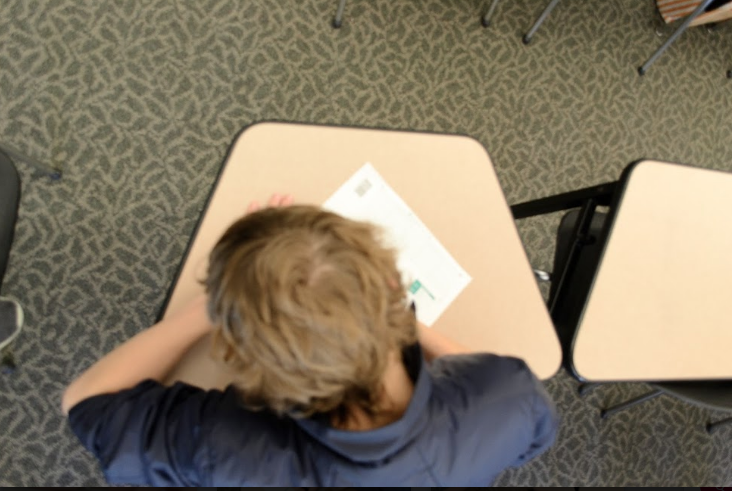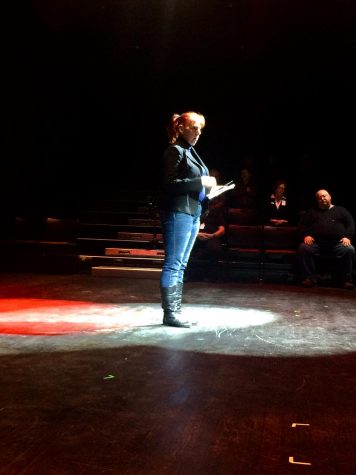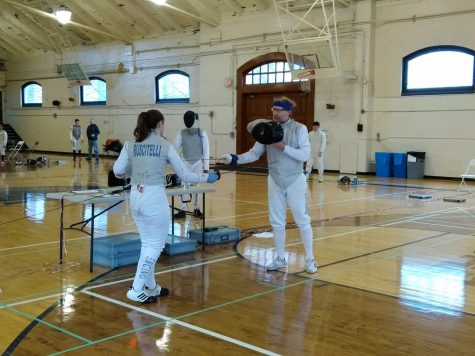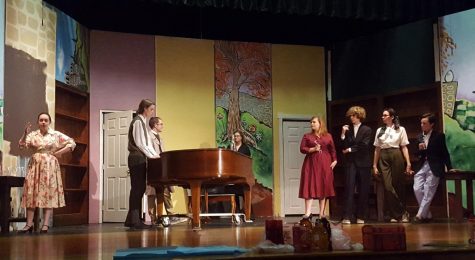Teachers on testing
Teachers discuss their opinions on standardized testing
A flurry of two hour delays was a result of recent state mandated testing; AP tests hang on the horizon like cumulonimbus clouds and the ACT is ever present in the mind of juniors. All these tests fall under the wide reaching umbrella of “standardized tests.”
These tests impact classes in different ways, varying from teacher to teacher on what portion of class time is devoted to any one of these tests. One such teacher is English teacher, Brian Martin, who devotes a portion of class time to preparation for the ACT.
“For juniors, the ACT is the big test so we spend some time working on grammar and reading comprehension. We also spend time on the PSAT at the beginning at the year, but the ACT is the big test for us,” Martin said.
Martin spends time preparing students for the ACT and PSAT via programs such as APEX, a current tool to help study for the ACT, as all juniors take the test.
“I’m torn about teaching to the standardized test because when you do that I feel like you miss opportunities to make deeper connections. [Standardized testing] also causes you to try to get certain skill sets that other people have determined are important… It can be difficult when you see the type of test prep the state provides, it’s not the way I would want to go about [teaching] that stuff,” Martin said.
The negatives often associated with testing, such as the time needed and the grip on curriculum, need to be balanced against possible benefits. For example, standardized tests provide the state with information on the quality of education received at schools and can sometimes be used by teachers as a way of marking growth among students.
“It may be beneficial for the state, but not for the student. I think it starts far too early. I think standardized tests for young children where there developmental levels are so different and so varied it begins a pattern of anxiety where school is concerned that doesn’t need to be there,” history teacher, Barb Acker said.
Acker has taught for twenty years, and like many veteran teachers, she’s seen the way standardized testing programs have evolved over the years. One large change, was seen in the “No Child Left Behind Act,” signed into law by President George W. Bush at Hamilton High School, in Hamilton Ohio.
“In the past decade, standardized testing has been emphasized greatly because it impacts public perception of how well we’re teaching, and how our students are doing. The test itself has become a goal in order to promote our school system,” Acker said.
Acker referenced the banners seen around the school celebrating various scholastic achievement, high test scores being a common point on these signs. One can take an even longer look with a teacher, such as Hobby, who has been in the business for three decades.
“When I first started, there was no such thing [as standardized testing], except for AP classes. There was no Ohio Graduation Test, or anything like that. We went from zero to 100 in 31 years. [Standardized Testing] has varied so much that it has not been consistent yet in 31 years. It’s kind of like the Red Queen hypothesis. Alice and the Queen were running, but they were never catching up to anything because it kept changing. In all those years there have probably been five different ways ninth graders have been assessed. What are they responsible for? What am I responsible as a teacher? Once you think you got it, it’s moved. Just like how Alice and the Queen never caught up. It’s kind of like evolution, actually, with parasites,” Hobby said.
Despite the changes in the past, the three teachers, Hobby, Martin, and Acker were asked what they would do if they were given the power to control standardized testing.
“I would change my job first of all, because I’d hate to be in charge of standardized testing. I would try to find a better balance of the national/localized piece. If standardized testing has to be a thing, I would love for them to put more trust in the teachers for getting the information across. Knowing that not every district is as strong as Oakwood, I realize that might not be an answer. I would certainly evaluate much more rigidly what my desired outcome is supposed to be. I feel like their not figuring a desired outcome, they just want something on the page that says, ‘Hey! We do standardized testing.’ The legislatures who make up the decisions are not trained as educators and they do what sounds good in the newspaper but its not the best or most useful way to go about it,” Martin said.
Hobby discussed the companies that produce the test.
“I wouldn’t use private companies to make the test. I think that needs to change. If we have to have them, I don’t think I would use a for profit company,” Hobby said.
Acker discussed using data to improve student success in the classroom.
“This may not be fair, but I would require that schools that are clearly not having success with their students, or maybe there are socio-economic challenges that are impacting student attendance and success. I would encourage, maybe require schools to have standardized tests to prove the growth and mastery of students. Schools like Oakwood, schools that are already doing really well, I would not require them to take standardized tests,” Acker said.
Acker struck upon another contentious aspect of standardized tests: fairness. The three teachers were unanimous in their views: No, the tests aren’t fair.
“Oh, God no. On so many levels it’s not [fair],” Martin said. “I don’t think it is unfair to a certain group, I think it’s unfair in different ways to different people. Especially the way the multiple choice was organized, I don’t think it’s indicative of the knowledge of a person.”










